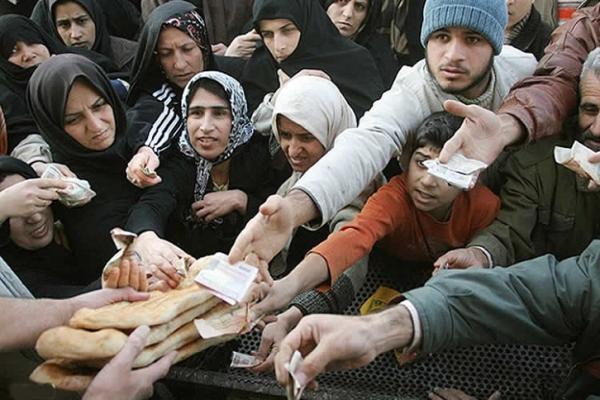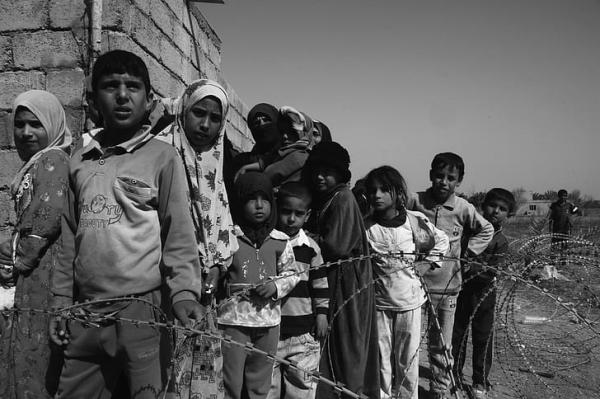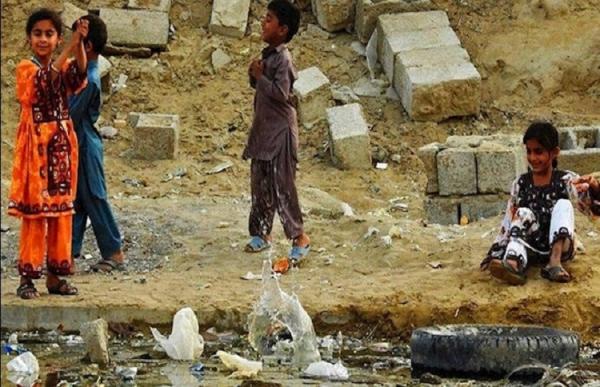The Islamic Republic of Iran (IRI) had no choice but to suppress the May 2022 uprising of the urban poor, because they cannot even provide bread for people! But people did not demand bread. Rather they repeatedly cried out and demanded the overthrow of the regime, chanting the slogans "Death to the Islamic Republic" and "Death to Khamenei." Just as the rulers of the IRI have no choice but to suppress the uprising, we, the people, have no choice but to try to overthrow this regime as soon as possible.

Iranian people crowd around a vendor to attempt to purchase bread.
Why? Because under this system, there is no solution to poverty and other problems—what we call the seven stops, or key social contradictions of Iranian society. They include: 1) poverty and unemployment; 2) political tyranny and fascist repression; 3) the oppression of women; 4) the national oppression of non-Persian nations (i.e. oppressed minorities); 5) environmental destruction; 6) theocratic government; and 7) the war crimes of the Islamic Republic in the Middle East.1
Although there are significant differences between recent uprisings and those of January 2017 and November 2019, we are still facing the challenge of how to take these uprisings to a higher level, in a way that can lead us to be able to overthrow the regime as soon as possible and create a fundamentally different society over its ruins. This is the question that communists must constantly pose to insurgents, rebels and themselves and be able to provide a theoretical and practical answer to.
People took to the streets in Abadan, south-west Iran, over a building collapse last Monday that killed at least 31 people. The protesters shouted down Ayatollah Mohsen Heidari AleKasir, an emissary sent by the supreme leader, Ayatollah Ali Khamenei, which led to clashes with riot police. Video credit: The Guardian
So the question is how can we create an organized and meaningful force from among the masses who have been part of these uprisings, in order to be able to organize a much more powerful force that is not only determined to overthrow this regime, but is also conscious and determined to create a fundamentally different society in place of the current one? In other words, how could a "movement for a communist revolution" be born and take the greatest advantage of the many crises facing this regime in order to be able to overthrow it and create a "New Socialist Republic of Iran"?
Consciousness is the lifeblood of such a movement. This means understanding the "problem as well as the solution." It means being aware of the need for such an organization and the roadmap that brings about such a solution. First of all, there is a need for deep and comprehensive knowledge, a scientific understanding of the nature of the IRI. It means grasping that we are confronting a system, and not a government of certain people with a specific mindset, or a handful of thieves and incompetents.
Of course, the leaders of the IRI have a special reactionary mindset—Islamist fascism (or fundamentalist Islamic fascism). And of course, they are both incompetent and thieves. But more importantly, they are the executors and managers of the capitalist system in Iran, which is dependent on the global capitalist-imperialist system. This system not only oppresses the people, but also produces a way of thinking: it thinks for them and trains them not to be scientifically aware of the events and sources of important political, social and economic events and crises.
For a deep and comprehensive insight into the Islamic Republic, besides recognizing its religious, repressive and fascistic nature, one must also understand the functioning of capitalism. While it is a fascist religious regime, the IRI’s cohesion and power are based on the capitalist mode of production. This is the method of production that forms the basis of the Islamic regime in Iran. The ruling capitalist class in Iran is not like the ruling capitalists in the United States, France, Russia, China and Japan. Rather, while it is part of the world capitalist system, Iran is a slave to that system, a dependent unit. The ruling regime in Iran, which dominates industry, agriculture, trade, banking, etc. supports the interests of the capitalist class. Today those interests are embodied in the Islamic Republic, which cannot exist and cannot have any independent identity apart from the functioning and driving forces of the world capitalist system. The existence of different imperialist countries competing over who controls or influences Iran does not mean that the Islamic Republic and its economic structure are independent of the imperialist powers.
Since coming to power, the IRI has been in conflict with Western imperialist powers, especially the United States. At the same time, it has subjected the entire economic and social life of Iran to the needs and functions of the world capitalist system, headed by these same imperialist powers. The IRI has intensified its reactionary hostility to Western imperialists while seeking greater dependence on Chinese and Russian imperialists. The result is so intense that even the availability of bread on people's tables is tied up with the rivalry between the imperialist powers, which are lining up against each other and fighting to redistribute and repolarize their spheres of global influence.
These features, along with the political and cultural character of the IRI, i.e. theocratic fascism, are among the basic concrete features of the Islamic regime. The only correct conclusion is that we need to overthrow the economic and social system that governs Iranian society and which are tied to the imperialist powers—whether American and European imperialists or Chinese and Russian imperialists. This conclusion should be crystallized and manifested in the slogans and policies of the various social movements in the field.
Causes of the High Prices of Wheat and Cooking Oil
A Revolutionary Guards-affiliated newspaper fabricated a series of lies that signaled the regime’s fear and surprise at the sudden rise in world wheat prices, saying they were caused by the war in Ukraine.2 The pro-regime "Axis of Resistance" faction blamed "the implementation of neoliberal policies by a neoliberal faction!"3 The rightist opponents of the IRI—from monarchists to liberals—blamed the inadequacy of the IRI and improper management in the government as the source of the shortages and price hikes of oil, wheat and essential goods. But the rise of wheat prices is not fundamentally caused by the Islamic Republic’s mismanagement, the various policies of the Iranian government, the war in Ukraine, or neoliberal policies! These factors result from more basic causes. The root and main cause of these problems is the system of capitalist production, and in the case of the Islamic Republic, it is also its essential nature and class character which we discussed earlier.

Iranian Children of War Waiting in Lines for Help - 2020
There is no doubt that the Ukraine war was a major factor in the rise of the price of wheat and other basic commodities in various parts of the world. The Ukrainian port of Odessa supplied the bulk of Africa's grain, and the bombardment by Russian occupying forces stopped loading at this port. Ukraine’s railway system and oil reserves have been allocated to NATO’s proxy war with Russia. Thus, Ukraine is unable to organize the land transportation of grain, chemical fertilizers, and other food items. In addition, nearly 30 percent of Ukraine's agricultural land has been turned into a battlefield, and millions of agricultural workers have been displaced or are at war. But the roots of this war also lie in the functioning of the capitalist system.4 Even the UN expert on food affairs who spoke at the Security Council meeting on May 19, 2022 said that: "the Russian Federation-Ukraine conflict did not start a food security crisis; it simply added fuel to a fire that was long in the works.” She went on to say that the world’s poor has increased by nearly 40 percent globally “in the last five months… equivalent to the number of people that China has taken out of poverty in the last 20 years,” adding that what lies ahead is not a periodic event, but rather it is an earthquake.5
Russia has banned exports from the Black Sea in retaliation for U.S. and European sanctions. China halted urea exports, which Indian farmers desperately need, leading to India refusing to export wheat. China has not only limited its grain exports due to poor wheat harvests this year, but has begun buying wheat and grains from all over the world in competition with other countries. They have closed shops that produce the majority of consumer and intermediate goods they exported to the world. And since China has so much control over most ports and waterways in the Indian Ocean, it can enforce this ban. Russia and Belarus have cut off potash and potassium exports to Brazil. Brazil is the largest producer of soybeans, but it cannot produce them without importing potash. In this way, grains and basic foodstuffs have become weapons in this war between imperialists over the division of the world.6 They can and do justify it. But before China and Russia, the United States and European countries have wielded this weapon many times with their own sanctions against other countries.

Poor children play near sewers in Iran
Capitalist Globalization and Changes in the Structure of Agriculture
Another very important structural factor that has shaped the world’s food situation today is the destruction of traditional and small indigenous agriculture in the dominated countries of Asia, Latin America and Africa. This has intensified since the 1990s, as overall agriculture has come under the control of commercial companies. These big industrial companies, in concert with technological developments, took control of seeds, land, and water from small local farmers in different countries. Using hybrid seed technology, fertilizers and planting technologies to control water and agricultural credit loans, they were able to dominate the world's agriculture. No small farmer in India can now cultivate their land without buying seeds and fertilizers annually and borrowing from large agribusiness companies like Monsanto-Bayer.
Another case is Pakistan, a country which relies heavily on agriculture but is dominated by the China-Pakistan Economic Corridor. It has replaced traditional wheat seeds with hybrid seeds from China’s Sinocom commercial-agricultural company. In this way, Pakistan's main food product has come under the control of a Chinese company. This type of agriculture is global capitalism’s new mode for the production of the world’s food…. Lack of gas and steel can disrupt the normal functioning of a society, but lack of food and water deprives society of life.
In the last two decades, traditional and local agriculture in African countries, and countries such as Pakistan and Iran, suffered when Chinese agricultural and commercial companies also entered the global agricultural capital market. In Iran, Jihad Sazandegi and other upstream government-affiliated organizations in partnership with Chinese, Korean, German, Turkish, Emirati, Russian, etc. capitals wreaked havoc on agriculture and monopolized land, water, and market resources. Their involvement resulted in people not even having bread today. The problem is not the lack of food being produced inside Iran, the problem is that it is not being produced for the people, but for global and regional markets. The capitalists consider it a "financial" asset.
With the war in Ukraine, bread became a scarce and precious commodity. But this war exposed and perpetuated an age-old fact: In the capitalist system, there is no right to "eat" for people. Bob Avakian formulated and explained this and the situation facing humanity and the world that puts two futures in front of us, as follows:
Now, people can proclaim the "right to eat," but there is no such right with the workings of this system. You cannot actually implement that as a right, given the dynamics of capitalism and the way in which, as we've seen illustrated very dramatically of late, it creates unemployment. It creates and maintains massive impoverishment.7
Either the capitalist-imperialist system—in which an exploiting class, and in particular the capitalist class (or bourgeoisie), through its political and administrative, bureaucratic and military functionaries, holds and exercises political power, expressed in a concentrated way as a monopoly of "legitimate" armed force, and along with that and underlying it the dynamics of capitalist accumulation, setting the fundamental terms for how society functions—either that, once again—or the socialist system, in which society is ruled in the most fundamental and largest interests of the formerly exploited class, the proletariat, and this political power is increasingly exercised by masses of people who are led, yes, by a communist vanguard, and conscious social planning of production increasingly replaces the driving force of anarchy of capitalist production (even while of course, there will always be ignorance as well as knowledge and necessity will always confront human beings, with the challenge of transforming it into freedom through struggle). 8